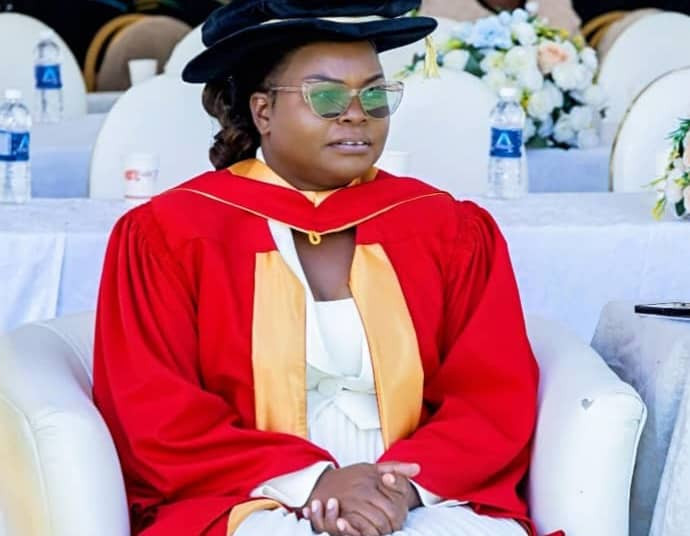
Schools across Zimbabwe have embraced innovation and technological development in their pursuit to create an enabling environment for Education 5.0, the government’s transformative framework that promotes teaching, research, innovation, industrialisation, and community service. From smart classrooms and digital libraries to coding clubs and virtual learning platforms, institutions are integrating technology to equip learners with 21st-century skills and drive national development.
One such school is Innovate Institute, which according to its director Esline Sibanda, is fostering growth through a cocktail of strategies tailor made to meet the demands of Education 5.0.
Sibanda (ES) shared with Standard Education (SE) her institution's remarkable trajectory as a result of value-driven strategy and consistent community engagement.
Below are excerpts from the interview.
SE: What key strategies or innovations do you attribute to this remarkable growth?
ES: Our growth from nine learners in 2019 to 635 today is the result of deliberate, values-driven strategy and consistent community engagement. Key elements were: a strong grassroots recruitment drive (home and community visits), provision of targeted scholarships for vulnerable but talented children, investment in qualified teachers and continuous professional development, a clear academic programme with extra tuition and remedial support, and the creation of visible co-curricular programmes (sports, music, agriculture) that made the school attractive to parents. We also prioritized affordability and transparency in fees, which built trust with families. Finally, strategic partnerships with local stakeholders and alumni referrals amplified our reach.
SE: What is your long-term vision for Innovate Institute in the next five years?
ES: Over the next five years we aim to consolidate quality while scaling responsibly. Our priorities are: becoming a regional centre of excellence with expanded science and technical facilities, formalising more scholarship pathways, strengthening industry and university linkages (locally and internationally), and growing our boarding capacity to serve learners from farther afield. We also want Innovate Institute to be a model for practical, entrepreneurial education — producing graduates who are employable, innovative and civically engaged.
- In the groove: ‘Devera Ngwena’ resurfaces at GZU graduation ceremony
- In the groove: ‘Devera Ngwena’ resurfaces at GZU graduation ceremony
- Education 5.0: Blessing or curse for UZ students?
- Addressing the issue of brain drain
Keep Reading
SE: How has the school managed to balance academic excellence with holistic learner development, given the rapid growth?
ES: We built that balance into our systems from day one. Academically, we maintain small class sizes where possible and run structured after-school clinics for exam classes. For holistic development we schedule regular co-curricular blocks (sports, music, clubs, agriculture and entrepreneurship). Each learner has access to pastoral care and a mentor teacher who tracks wellbeing and progress, ensuring no child is lost in numbers. Staffing, timetable design and a culture that values both character and intellect are key.
SE: What measures or systems are in place to maintain — or even improve — the 100% A-level and 89% O-level pass rates?
ES: We use a layered approach: rigorous continuous assessment (termly and mock exams), data-driven interventions for students who fall behind, subject-specific remedial classes, exam skills workshops, and regular teacher moderation to ensure marking consistency and curriculum coverage. We also engage parents with progress reports and learning contracts. To improve further we are expanding specialist teacher recruitment, investing in laboratory and ICT resources, and deepening partnerships that provide focused tuition and revision camps before public exams.
SE: How do you ensure learners are prepared for real-world challenges beyond the classroom?
ES: Practical learning is central. Our curriculum includes project-based learning, entrepreneurship modules, and real workplace simulations (for example running small enterprises on campus and agricultural production projects). We run regular career guidance and work-readiness workshops, invite industry speakers, and organise internships and university application support. Personal development — leadership, resilience, communication — is taught through clubs, community service and school governance opportunities.
SE: What impact has becoming both a Zimsec and Cambridge Examination Centre had on competitiveness and reputation?
ES: Being dual-accredited raised our profile significantly. It gives parents more choice and signals a commitment to international standards while remaining rooted in the national system. Operationally it required strengthening exam administration, improving facilities and upgrading teacher training — all of which benefited teaching and learning. The result has been greater trust from parents, easier access to international university pathways for our learners, and stronger competitiveness when recruiting talented teachers and partners.
SE: How does the school support students in accessing international opportunities?
ES: We provide targeted counselling on study destinations and scholarships, assistance with applications and documentation, and partnerships with universities and agents who vet legitimate pathways.
For top candidates we help prepare for entrance tests and interviews and provide references and financial planning advice. Alumni networks and relationships we’ve established in India, China, Hong Kong and South Africa also open doors for placements and mentorship.
SE: How is the school nurturing sporting talent while ensuring learners remain focused on academics?
ES: Sporting excellence is integrated into the school timetable so it complements rather than competes with academics. Talented athletes have structured timetables with protected study periods, academic monitoring and remedial support when needed. Coaches work with teachers to coordinate demands, and we require minimum academic standards to represent the school. Success stories, such as a former student joining the national team, are celebrated as examples of balanced achievement.
SE: Tell us about the Vocals Music Ministries group and musical support at Innovate Institute.
ES: Vocals Music Ministries began as a small chapel choir and grew into a formal extracurricular group that nurtures vocal technique, songwriting, performance and stagecraft. The school supports them with rehearsal space, mentorship from local musicians, opportunities to perform at community events and the annual awards ceremony, and access to basic recording equipment. Music is seen as both cultural expression and a potential career path, so we encourage participation across ages and provide platforms for public exposure.
SE: How integral are agriculture and business projects to the curriculum and economic empowerment?
ES: Very integral. Agricultural plots and business incubators are part of our practical learning strategy. Learners plant and manage crops, learn value-addition, bookkeeping, marketing and profit distribution. These projects teach practical skills, reduce school running costs, and sometimes generate income that funds student bursaries. The result is that learners graduate with entrepreneurial mindsets and practical skills they can apply immediately in their communities.
SE: How does Innovate Institute foster strong relationships with community and partners?
ES: We maintain frequent, structured contact: community meetings, open days, parent-teacher forums, and stakeholder advisory committees. We also involve local businesses in sponsorship and mentorship roles and invite community leaders to school functions. Transparency in finances and demonstrated impact (scholarships, community projects) has encouraged continued support. Relationships are nurtured through mutual respect and clear shared objectives for learner wellbeing.
SE: How are values like discipline, cultural heritage and innovation embedded into daily school life?
ES: Values are embedded through policy and practice: a clear code of conduct, morning assemblies that include cultural reflection, a culture club that teaches traditional arts, and innovation days where learners present practical projects. Teachers model values daily, and discipline is linked to restorative practices rather than only punishment. Innovation is celebrated with school fairs and problem-solving competitions that reward creative solutions to local challenges.
SE: How is Innovate Institute contributing to Zimbabwe’s Education 5.0 philosophy?
ES: We align closely with Education 5.0 by emphasising skills for industrialisation and entrepreneurship, blended learning, and industry linkages. Our practical agricultural and technical projects, entrepreneurship training and partnerships with industry support localised industrial skills. We are introducing more STEM and applied technology modules to equip learners for the demands of a modern, industrialising economy.
SE: What were the biggest obstacles since establishment, and how were they overcome?
ES: The early challenges were infrastructure constraints, limited funding, and scepticism from a community used to established schools. We overcame these by phased expansion (prioritising classrooms and labs), active fundraising (community, alumni and small grants), demonstrating results through early exam successes, and maintaining open dialogue with parents. Staffing was another challenge — we addressed it through attractive teacher development programmes and a values-aligned recruitment process.
SE: What support does the institute need to continue growing?
ES: We need continued government support in areas like teacher deployment and subsidies for STEM resources, private-sector partnerships for internships and infrastructure investment, and donor support for bursaries and capital projects (science labs, ICT, and boarding facilities). Technical assistance in school leadership and scaled teacher training would also accelerate our impact.
SE: How will Justice Matsatsira’s pledged support enhance infrastructure and learner empowerment programmes?
ES: Justice Matsatsira’s pledge is a catalyst. His endorsement helps mobilise other partners and lends credibility to our fundraising appeals. We expect the partnership to accelerate specific infrastructure projects — expanded classrooms, better laboratories and sports facilities — and to support targeted empowerment programmes such as scholarships, mentorships and career guidance initiatives. This will broaden access and deepen the quality of opportunities available to our learners.
SE: The Vulnerable Shelter Trust is one of your major philanthropic initiatives. How has it helped learners at Innovate Institute, and how can the public support this work?
ES: The Vulnerable Shelter Trust was established to ensure that financial hardship does not deprive gifted or determined learners of access to quality education. Through the Trust, we currently sponsor 29 learners at Innovate Institute — providing full or partial scholarships that cover tuition, uniforms, and sometimes meals or boarding fees. Many of these children come from disadvantaged rural communities and have gone on to excel both academically and socially.
Beyond financial assistance, the Trust provides mentorship, psychosocial support, and empowerment workshops, helping our learners build confidence and resilience. It has become a lifeline not only for beneficiaries but also for their families, transforming lives one child at a time.
As we continue to expand this mission, we welcome partnerships and donations from individuals, corporates, and well-wishers who share our vision. Every contribution — whether monetary, material, or advisory — directly supports a learner’s journey toward a brighter, self-sustaining future. Those wishing to assist can contact the Innovate Institute offices or reach the Trust directly for details on how to contribute.











